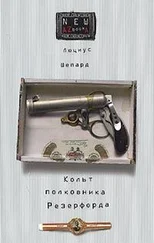We were standing in one of the dusty streets back of the beach, not far from a bakery, a little shop with dozens of loaves of bread laid neatly in the window, and at that moment a member of the Guardia Civil poked his head out the door. He was munching a sweet roll, watching us with casual interest: a short, swarthy man, wearing an olive green uniform with fancy epaulets, an automatic rifle slung over his shoulder, and sporting one of those goofy patent-leather hats. Shockley blanched at the sight, wheeled around, and walked away. I was about to walk away myself, but the guardsman beckoned. With a sinking feeling in the pit of my stomach, I went over to him.
“Cobarde,” he said, gesturing at Shockley.
My Spanish was poor, but I knew that word: coward. “Yeah,” I said. “In ingles, cobarde means chickenshit.”
“Cheek-sheet,” he said; then, more forcefully: “Cheek-sheet!”
He asked me to teach him some more English; he wanted to know all the curse words. His name was Francisco, he had fierce bad breath, and he seemed genuinely friendly. But I knew damn well that he was most likely trying to recruit me as an informant. He talked about his family in Seville, his girlfriend, how beautiful it was in Spain. I smiled, kept repeating. “Si, si,” and was very relieved when he had to go off on his rounds.
Despite Shockley’s attitude, the rest of the expatriates began to accept the twins, lumping us together as weirdos of the most perverted sort, yet explicable in our weirdness. From Don Washington I learned that Tom, Alise, and I were thought to be involved in a ménage à trois, and when I attempted to deny this, he said it was no big thing. He did ask, however, what I saw in Alise; I gave some high-school reply about it all being the same in the dark, but in truth I had no answer to his question. Since Alise had moved in, my life had assumed a distinct pattern. Each morning I would hurry off to Malaga to work on the movie set; each night I would return home and enter into brainless rut with Alise. I found this confusing. Separated from Alise, I felt only mild pity for her, yet her proximity would drive me into a lustful frenzy. I lost interest in writing, in Spain, in everything except Alise’s undernourished body. I slept hardly at all, my temper worsened, and I began to wonder if she were a witch and had ensorcelled me. Often I would come home to discover her and Tom sitting stoned on my porch, the floor littered with sketches of those circuitlike designs (actually they less resembled circuits than a kind of mechanistic vegetation). I asked once what they were. “A game,” replied Alise, and distracted me with a caress.
Two weeks after she moved in, I shouted at the assistant director of the movie (he had been instructing me on how to throw a wineskin with the proper degree of adulation as the English actor-matador paraded in triumph around the bullring) and was fired. After being hustled off the set, I vowed to get rid of Alise, whom I blamed for all my troubles. But when I arrived home, she was nowhere to be seen. I stumped over to Tom’s house and pounded on the door. It swung open, and I peeked inside. Empty. Half a dozen notebooks were scattered on the floor. Curiosity overrode my anger. I stepped in and picked up a notebook.
The front cover was decorated with a hand-drawn swastika, and while it is not uncommon to find swastikas on notebook covers—they make for entertaining doodling—the sight of this one gave me a chill. I leafed through the pages, noticing that though the entries were in English, there were occasional words and phrases in German, these having question marks beside them; then I went back and read the first entry.
The Führer had been dead three days, and still no one had ventured into the office where he had been exposed to the poisoned blooms, although a servant had crawled along the ledge to the window and returned with the news that the corpse was stiffened in its leather tunic, its cheeks bristling with a dead man’s growth, and strings of desiccated blood were hanging from its chin. But as we well remembered his habit of reviving the dead for a final bout of torture, we were afraid that he might have set an igniter in his cells to ensure rebirth, and so we waited while the wine in his goblet turned to vinegar and then to a murky gas that hid him from our view. Nothing had changed. The garden of hydrophobic roses fertilized with his blood continued to lash and slather, and the hieroglyphs of his shadow selves could be seen patrolling the streets…
The entry went on in like fashion for several pages, depicting a magical-seeming Third Reich, ruled by a dead or moribund Hitler, policed by shadow men known collectively as The Disciples, and populated by a terrified citizenry. All the entries were similar in character, but in the margins were brief notations, most having to do with either Tom’s or Alise’s physical state, and one passage in particular caught my eye:
Alise’s control of her endocrine system continues to outpace mine. Could this simply be a product of male and female differences? It seems likely, since we have all else in common.
Endocrine? Didn’t that have something to do with glands and secretions? And if so, couldn’t this be a clue to Alise’s seductive powers? I wished that old Mrs. Adkins (General Science, fifth period) had been more persevering with me. I picked up another notebook. No swastika on the cover, but on the foreleaf was written: “Tom and Alise, ‘born’ 12 March 1944.” The entire notebook contained a single entry, apparently autobiographical, and after checking out the window to see if the twins were in sight, I sat down to read it.
Five pages later I had become convinced that Tom was either seriously crazy or that he and Alise were the subjects of an insane Nazi experiment…or both. The word clone was not then in my vocabulary, but this was exactly what Tom claimed that he and Alise were. They, he said, along with eighteen others, had been grown from a single cell (donor unknown), part of an attempt to speed up development of a true Master Race. A successful attempt, according to him, for not only were the twenty possessed of supernormal physical and mental abilities, but they were stronger and more handsome than the run of humanity: this seemed to me wish fulfillment, pure and simple, and other elements of the story—for example, the continuation of an exotic Third Reich past 1945—seemed delusion. But upon reading further, learning that they had been sequestered in a cave for almost twenty years, being educated by scientific personnel, I realized that Tom and Alise could have been told these things and have assumed their truth. One could easily make a case for some portion of the Reich having survived the war.
I was about to put down the notebook when I noticed several loose sheets of paper stuck in the rear; I pulled them out and unfolded them. The first appeared to be a map of part of a city, with a large central square labeled “Citadel,” and the rest were covered in a neat script that— after reading a paragraph or two—I deduced to be Alise’s.
Tom says that since I’m the only one ever to leave the caves (before we all finally left them, that is), I should set down my experiences. He seems to think that having even a horrid past is preferable to having none, and insists that we should document it as well as we can. For myself I would like to forget the past, but I’ll write down what I remember to satisfy his compulsiveness.
When we were first experimenting with the tunnel, we knew nothing more about it than that it was a metaphysical construct of some sort. Our control of it was poor, and we had no idea how far it reached or through what medium it penetrated. Nor had we explored it to any great extent. It was terrifying. The only constant was that it was always dark, with fuzzy different-colored lights shining at what seemed tremendous distances away. Often you would feel disembodied, and sometimes your body was painfully real, subject to odd twinges and shocks. Sometimes it was hard to move—like walking through black glue, and other times it was as if the darkness were a frictionless substance that squeezed you along faster than you wanted to go. Horrible afterimages materialized and vanished on all sides—monsters, animals, things to which I couldn’t put a name. We were almost as frightened of the tunnel as we were of our masters. Almost.
Читать дальше






